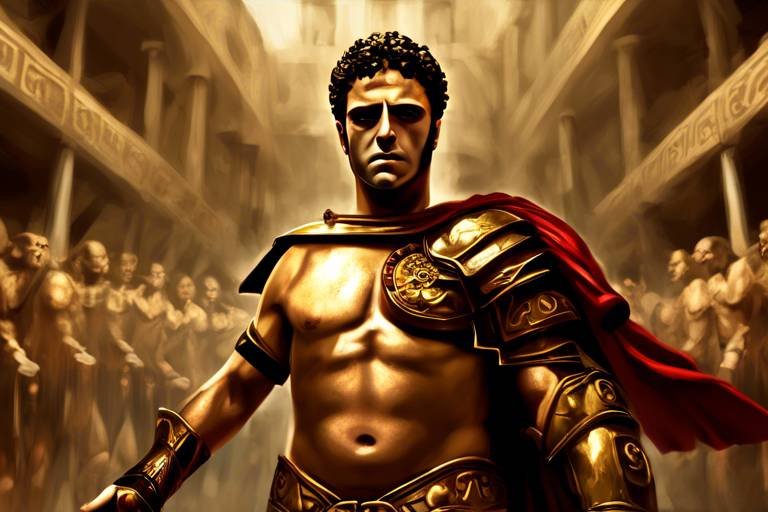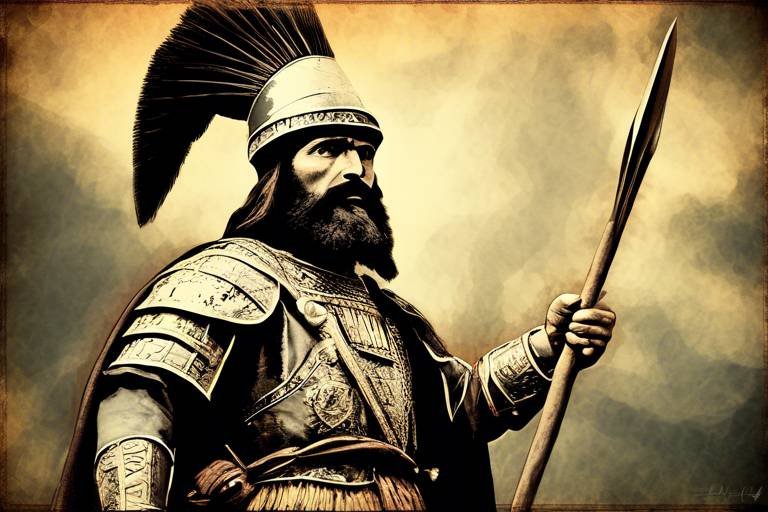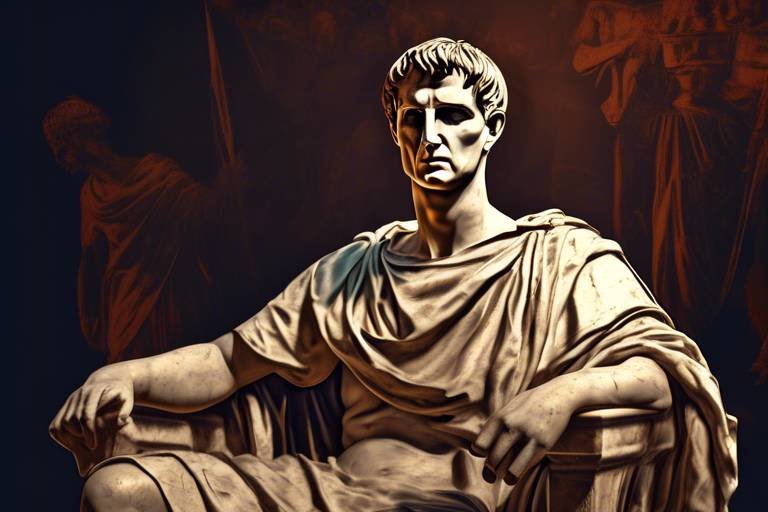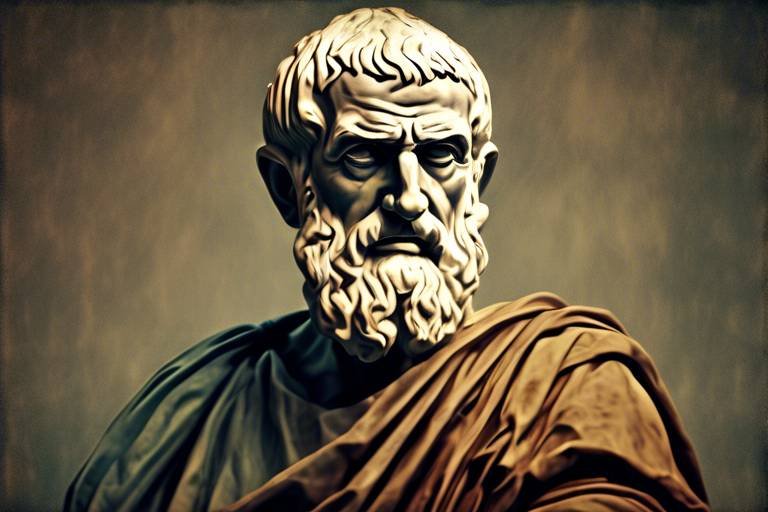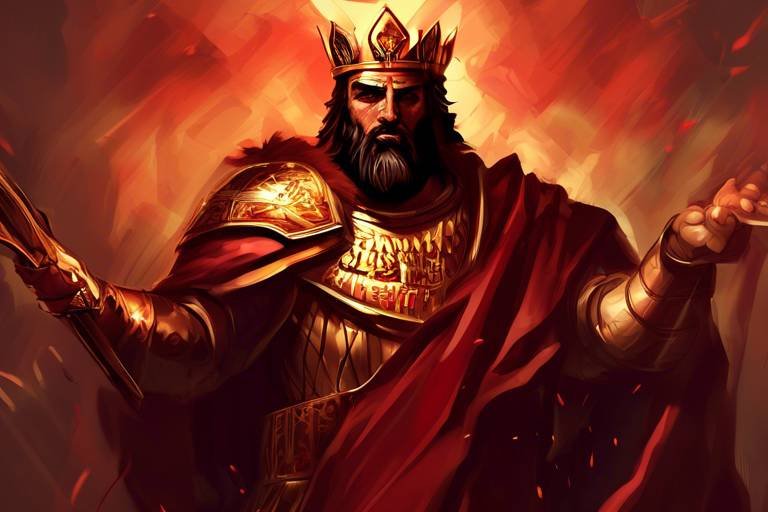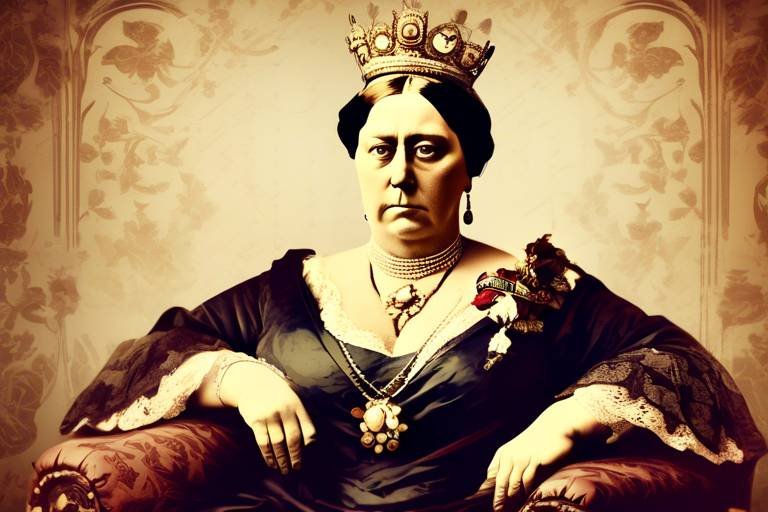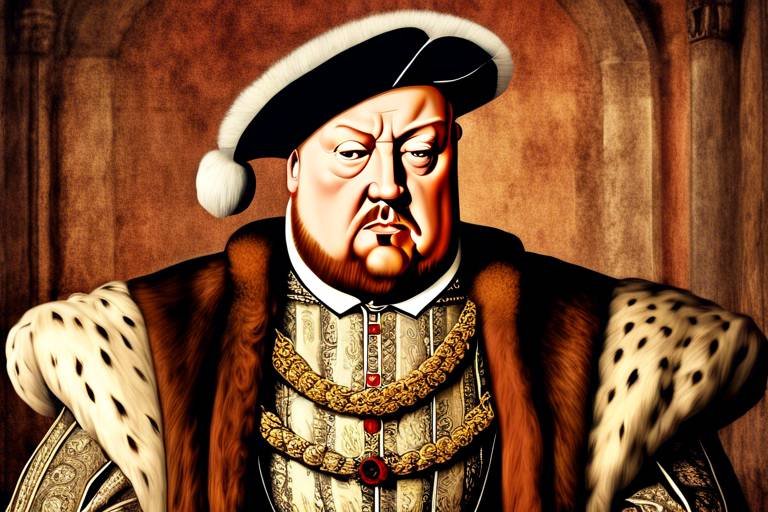Commodus: The Gladiator Emperor
Commodus, known as the Gladiator Emperor, was a fascinating figure in Roman history. His reign was marked by a unique blend of power, extravagance, and controversy. Born into the prestigious Aurelian dynasty, Commodus was the son of the revered Emperor Marcus Aurelius. His ascension to the throne was met with both anticipation and skepticism, as he inherited the empire at a young age following his father's death.
One of the most intriguing aspects of Commodus' rule was his fervent passion for gladiatorial combat. Unlike any other Roman Emperor before him, Commodus actively participated in these brutal games, often entering the arena to fight as a gladiator himself. His obsession with these spectacles not only captivated the Roman populace but also raised eyebrows among the elite classes.
Despite his prowess in the arena, Commodus' political decisions and conflicts with the Senate sparked widespread controversy. His autocratic tendencies and disregard for traditional governance structures led to internal strife within the empire. The stability of Rome was threatened as Commodus increasingly isolated himself from his advisors and pursued his own agenda.
The plot to assassinate Commodus was a culmination of growing discontent among the ruling class. The conspiracy ultimately succeeded, bringing an end to the Gladiator Emperor's tumultuous reign. The aftermath of his death left the Roman Empire in a state of uncertainty, with power struggles and succession crises looming on the horizon.
Commodus' legacy is a complex tapestry of admiration and condemnation. Historians have debated his impact on Roman history, with some viewing him as a tyrant whose rule hastened the empire's decline, while others see him as a tragic figure consumed by his own ambitions. The varying perspectives on Commodus reflect the enigmatic nature of his reign.
In popular culture, Commodus has been immortalized in various forms of media, from films like "Gladiator" to novels and documentaries. These portrayals often sensationalize his character, depicting him as a ruthless and megalomaniacal ruler. While these interpretations may take creative liberties, they offer a glimpse into the enduring fascination with Commodus' dramatic life.
Delving into the psychological profile of Commodus unveils a complex individual driven by a mix of power, insecurity, and a thirst for glory. His erratic behavior and grandiose ambitions shed light on the inner workings of a leader whose legacy continues to intrigue and perplex historians to this day.
Comparisons between Commodus and other Roman Emperors reveal both similarities and contrasts in their leadership styles. While some rulers shared his penchant for extravagance and authoritarianism, others stood out for their military prowess or administrative acumen. Understanding how Commodus fits into the tapestry of Roman history offers valuable insights into the complexities of imperial rule.

Early Life and Ascension to Power
Exploring the life and reign of Commodus, the Roman Emperor known for his love of gladiatorial combat and controversial rule over the empire.
Commodus, born on August 31, 161 AD, was the son of the renowned Roman Emperor Marcus Aurelius. His early life was marked by privilege and high expectations, as he was groomed to one day take the throne. Despite his father's efforts to prepare him for leadership, Commodus showed a penchant for indulgence and extravagance from a young age.
Upon the death of Marcus Aurelius in 180 AD, Commodus ascended to the imperial throne at the age of just 18. His succession was met with a mix of hope and apprehension among the Roman populace and the Senate, unsure of what kind of ruler he would become.
Commodus' reign was characterized by his intense passion for gladiatorial combat. He often participated in the games himself, seeing it as a way to connect with the common people and boost his own ego. His extravagant displays in the arena, where he fought as a gladiator under the alias "Hercules," became a central focus of his rule.
Despite his popularity among the masses for his gladiatorial prowess, Commodus faced numerous political controversies during his reign. His disregard for Senate traditions and his tendency to appoint corrupt officials led to growing discontent among the ruling elite. The stability of the Roman Empire was increasingly called into question as Commodus' decisions sparked unrest and dissent.
The dissatisfaction with Commodus' rule culminated in a conspiracy to assassinate him in 192 AD. Though the initial attempt failed, a group of conspirators eventually succeeded in poisoning the Emperor. Commodus' death marked the end of his tumultuous reign and plunged the empire into a period of uncertainty and power struggles.
Commodus' legacy is a complex and divisive subject among historians. While some view him as a tyrant whose rule hastened the decline of the Roman Empire, others argue that his actions were a symptom of larger systemic issues. The varying perspectives on Commodus reflect the enduring debate over his impact on Roman history.
Commodus has been a popular figure in popular culture, appearing in films like "Gladiator" and inspiring characters in literature and art. These portrayals often emphasize his megalomania and thirst for power, though they may take creative liberties with historical accuracy.
Psychologists and historians have long debated the psychological motivations behind Commodus' behavior. Some theories suggest he suffered from narcissistic personality disorder, explaining his need for adoration and grandiosity. Others point to a troubled relationship with his father and the pressures of imperial rule as contributing factors to his actions.
When compared to other Roman Emperors, Commodus stands out for his unique blend of martial prowess and political missteps. While some see parallels between his rule and that of Caligula or Nero, others argue that Commodus' reign was a product of its time, shaped by larger historical forces at play.

Gladiatorial Obsession
Exploring the life and reign of Commodus, the Roman Emperor known for his love of gladiatorial combat and controversial rule over the empire.
Commodus' obsession with gladiatorial combat was unparalleled in Roman history. He saw himself not just as an Emperor but as a skilled gladiator, often participating in fights himself. His extravagant displays in the arena captivated the Roman people, who were both awed and shocked by his willingness to engage in such brutal contests. This passion for the games consumed much of his time and attention, leading to neglect of his duties as Emperor.
Commodus' gladiatorial obsession had a significant impact on his reign. While his performances entertained the masses, they also undermined his authority and dignity as a ruler. The spectacle of the Emperor fighting in the arena blurred the lines between power and entertainment, causing unrest among the Roman elite and eroding the traditional reverence for the Emperor.
His gladiatorial pursuits not only alienated the Senate but also drained the empire's resources, as he spared no expense in staging elaborate games and competitions. This extravagant behavior further fueled the discontent within the political circles and contributed to the growing instability during his rule.
Despite his prowess in the arena, Commodus' gladiatorial obsession ultimately proved to be his downfall. The distractions caused by his fixation on the games left him vulnerable to political scheming and internal strife. As his grip on power weakened, the stage was set for the events that would lead to his demise and the end of his controversial reign.

Political Controversies
Exploring the life and reign of Commodus, the Roman Emperor known for his love of gladiatorial combat and controversial rule over the empire.
Details about Commodus' upbringing, his relationship with his father Marcus Aurelius, and how he became Emperor of Rome.
An in-depth look at Commodus' passion for participating in gladiatorial games, his extravagant displays in the arena, and the impact on his reign.
During his rule, Commodus faced numerous political controversies that shook the foundations of the Roman Empire. His decisions often clashed with the traditional values upheld by the Senate, leading to power struggles and unrest within the empire. The Senate, accustomed to a certain level of authority and influence, found itself at odds with Commodus' autocratic tendencies and disregard for their opinions.
Commodus' lavish spending on gladiatorial games and personal indulgences further exacerbated tensions with the Senate and the people of Rome. His prioritization of entertainment and self-gratification over the welfare of the empire drew criticism and fueled dissent among the ruling class and citizens alike.
Moreover, Commodus' attempts to centralize power in his own hands and diminish the authority of the Senate sparked fears of tyranny and despotism. His disregard for the traditional checks and balances of Roman governance created a volatile political environment, where loyalty to the Emperor often meant turning against one's own colleagues and principles.
Examining the conspiracy to assassinate Commodus, the events leading to his death, and the aftermath for the Roman Empire.
Analysis of how Commodus is remembered in history, the impact of his reign on the Roman Empire, and the varying perspectives of historians.
Exploring how Commodus has been depicted in films, books, and other forms of media, and the accuracy of these portrayals compared to historical records.
Investigation into the psychological motivations behind Commodus' actions, his personality traits, and the theories regarding his behavior as Emperor.
Contrasting Commodus' rule with that of other Roman Emperors, examining similarities and differences in their leadership styles and legacies.

Assassination Plot and Death
Commodus' reign as Emperor of Rome was marked by controversy and intrigue, leading to a dramatic end through an assassination plot that shook the foundations of the Roman Empire. As his rule progressed, discontent grew among the Senate and the people, culminating in a conspiracy to remove Commodus from power.
The assassination plot against Commodus was orchestrated by members of his inner circle, including his own advisers and court officials who saw his erratic behavior and despotic tendencies as a threat to the stability of the empire. The conspirators sought to restore order and prevent further deterioration of Rome under Commodus' rule.
On the fateful day of the assassination attempt, Commodus was lured into a trap set by the conspirators, who had infiltrated his inner circle under the guise of loyalty. As he attended a gladiatorial event in the arena, the assassins made their move, attempting to poison the Emperor during the festivities.
However, the plot took a different turn when the poison failed to act swiftly, prompting the conspirators to resort to more direct methods. In a moment of chaos and confusion, Commodus was confronted and strangled to death by one of the conspirators, bringing an abrupt end to his tumultuous reign.
The death of Commodus sent shockwaves throughout the Roman Empire, triggering a power vacuum and a period of uncertainty as rival factions vied for control. The aftermath of his assassination ushered in a new era of political upheaval and instability, shaping the future course of Roman history.

Legacy and Historical Perception
Commodus, the enigmatic Emperor of Rome, left a legacy that continues to intrigue historians and enthusiasts alike. His reign, marked by controversy and extravagance, has been a subject of fascination for centuries. Historically, Commodus is often portrayed as a tyrant whose rule weakened the foundations of the Roman Empire. His penchant for gladiatorial combat and disregard for traditional governance norms have contributed to his negative historical perception.
Despite the negative connotations associated with his rule, some modern historians argue that Commodus' actions were a product of his upbringing and the turbulent political climate of the time. The complexities of his character and the challenges he faced as Emperor have sparked debates regarding his true intentions and motivations. Was Commodus a power-hungry despot or a misunderstood ruler grappling with immense pressure?
Furthermore, the historical perception of Commodus is not static; it has evolved over time as new research and interpretations emerge. While some view him as a symbol of imperial decline, others highlight his impact on the evolution of Roman politics and society. The varying perspectives on Commodus reflect the complexity of his reign and the challenges faced by historians in unraveling the truth behind the myths.
When examining Commodus' legacy, it is essential to consider the broader implications of his rule on the Roman Empire. The destabilizing effects of his policies and the erosion of traditional power structures had far-reaching consequences that reverberated long after his death. The legacy of Commodus serves as a cautionary tale of the dangers of unchecked power and the fragility of empires built on the ambitions of individual rulers.

Portrayal in Popular Culture
Commodus, the Gladiator Emperor, has captured the imagination of popular culture through various mediums such as films, books, and television shows. One of the most notable portrayals of Commodus is in the blockbuster film "Gladiator," where he is depicted as a power-hungry and erratic ruler obsessed with his own glory in the arena. The character's complex nature and descent into madness have fascinated audiences worldwide, sparking debates on the accuracy of historical depictions versus cinematic dramatizations.
In literature, Commodus often appears as a villainous figure, embodying the worst traits of absolute power. Authors use his character to explore themes of corruption, tyranny, and the consequences of unchecked authority. These portrayals serve as cautionary tales, reminding readers of the dangers of hubris and megalomania.
While popular culture tends to sensationalize Commodus' reign for entertainment value, some adaptations strive for historical accuracy. Through meticulous research and attention to detail, certain works aim to present a more nuanced and authentic portrayal of the Emperor and the turbulent era in which he lived. By blending fact with fiction, these interpretations offer a compelling glimpse into the complexities of Roman politics and society.
Moreover, Commodus' presence in popular culture reflects society's enduring fascination with larger-than-life figures and the allure of ancient Rome. The Emperor's story serves as a mirror through which contemporary audiences can examine themes of power, ambition, and the fragility of leadership. Whether portrayed as a tragic figure or a malevolent force, Commodus continues to captivate audiences with his dramatic narrative and controversial legacy.

Psychological Profile
Exploring the life and reign of Commodus, the Roman Emperor known for his love of gladiatorial combat and controversial rule over the empire.
Details about Commodus' upbringing, his relationship with his father Marcus Aurelius, and how he became Emperor of Rome.
An in-depth look at Commodus' passion for participating in gladiatorial games, his extravagant displays in the arena, and the impact on his reign.
Discussion on the political decisions made by Commodus, his conflicts with the Senate, and the repercussions on the stability of the Roman Empire.
Examining the conspiracy to assassinate Commodus, the events leading to his death, and the aftermath for the Roman Empire.
Analysis of how Commodus is remembered in history, the impact of his reign on the Roman Empire, and the varying perspectives of historians.
Exploring how Commodus has been depicted in films, books, and other forms of media, and the accuracy of these portrayals compared to historical records.
Investigation into the psychological motivations behind Commodus' actions, his personality traits, and the theories regarding his behavior as Emperor. Some historians suggest that his erratic behavior and obsession with gladiatorial combat may stem from a deep-seated need for validation and power. His actions could be seen as a manifestation of his inner struggles and insecurities, leading to a reign marked by extravagance and instability.
Contrasting Commodus' rule with that of other Roman Emperors, examining similarities and differences in their leadership styles and legacies.
Stay tuned for the FAQ section at the end of the article for answers to common queries about Commodus, his reign, and his impact on Roman history.

Comparisons to Other Emperors
When comparing Commodus to other Roman Emperors, his rule stands out for its unique blend of extravagance and brutality. Unlike the stoic leadership of Marcus Aurelius, Commodus' reign was marked by a flamboyant display of power and a thirst for public adoration. While some Emperors focused on expanding the empire through military conquests, Commodus indulged in the gladiatorial arena, seeking fame and glory through combat rather than statesmanship.
One of the most notable comparisons can be drawn between Commodus and Nero, another Emperor known for his erratic behavior and self-indulgence. Both rulers faced opposition from the Senate and engaged in lavish spending on personal pleasures, leading to financial strain on the empire. However, while Nero's reign ended in chaos and his own demise, Commodus met a similar fate but left a more enduring legacy of excess and decadence.
On the other hand, when juxtaposed with Augustus, the first Emperor of Rome, Commodus appears as a stark contrast in leadership style. Augustus focused on establishing a stable government and promoting the arts and culture, laying the foundation for the Pax Romana. In contrast, Commodus' rule was characterized by instability and a disregard for traditional governance, leading to internal strife and challenges to imperial authority.
Comparing Commodus to other Emperors highlights the complexities of Roman leadership and the diverse impact each ruler had on the empire's trajectory. While some Emperors left a lasting legacy of reform and prosperity, others like Commodus left behind a legacy of excess and decline, shaping the course of Roman history for centuries to come.
Frequently Asked Questions
- Who was Commodus?
Commodus was a Roman Emperor who ruled from 180 to 192 AD. He is known for his love of gladiatorial combat and extravagant displays in the arena.
- How did Commodus become Emperor?
Commodus became Emperor after the death of his father, Marcus Aurelius. He was the first emperor to inherit the throne as the son of a reigning emperor.
- What was Commodus' relationship with the Senate?
Commodus had a strained relationship with the Senate due to his autocratic rule and disregard for traditional Roman political norms.
- How did Commodus die?
Commodus was assassinated in a conspiracy orchestrated by members of his own inner circle. The exact circumstances of his death remain a topic of historical debate.
- How is Commodus remembered in history?
Commodus is often viewed as a tyrannical and decadent ruler whose reign marked the beginning of the decline of the Roman Empire.
- How accurate are portrayals of Commodus in popular culture?
Portrayals of Commodus in popular culture often exaggerate his megalomania and cruelty, deviating from historical records to create a more dramatic narrative.

